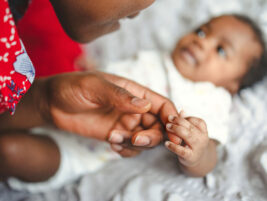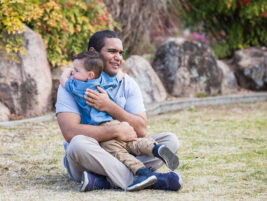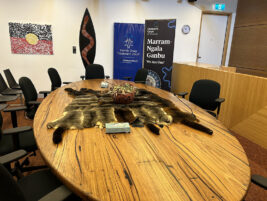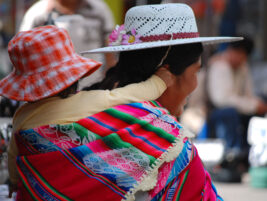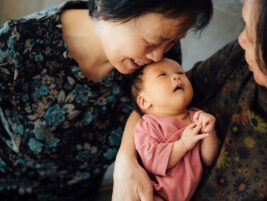Introduction
Decolonizing infant and early childhood mental health consultation (IECMHC) professional development (PD) requires rethinking how we conceptualize, train, and support consultants in the field. A decolonized approach recognizes that mainstream models of IECMHC PD often fail to fully account for the lived experiences of historically marginalized communities. This gap reinforces Western cultural norms and overlooks the historical and political forces shaping the well-being of Black, Indigenous, and other marginalized children and families. PD is central to decolonization, as it creates spaces where consultants are supported in deep self-reflection, encouraged to challenge assumptions, and provided opportunities to practice.
While this paper focuses primarily on decolonizing PD in the U.S. context, we acknowledge the importance of expanding these insights to a global context. Reflective practice models, especially those rooted in Western frameworks, may not align with the relational norms, communal values, or historical realities of other cultural settings (Killian, 2018; Westerberg, 2016). For decolonization to be meaningful globally, efforts must be guided by local communities and culturally grounded epistemologies. In some countries, this may mean embedding IECMHC within collective caregiving systems or aligning consultation with spiritual and ancestral traditions of well-being.
In the United States, decolonizing PD and reflective practice are particularly urgent. Persistent racial inequities in early childhood systems, such as higher rates of expulsion and exclusionary discipline for Black children, reflect the lasting impacts of systemic racism and bias. Despite growing calls for equity, traditional PD models have often failed to equip early childhood professionals with the skills needed to critically examine and disrupt these patterns. Consequently, there is a pressing need for approaches that center relational practices, historical awareness, and critical self-reflection. Decolonizing IECMHC PD is not only an idea but a necessary approach to transform the relationships and systems that affect marginalized children and families.
The purpose of this paper is to present research findings that informed the development of PD framework for anti-bias IECMHC (COE, 2025a), along with an accompanying resource outlining five essential elements (COE, 2025b) necessary for consultants to engage in and embody anti-bias IECMHC practice. The framework emphasizes the critical role of the trainer in fostering deep reflection among consultants and creating opportunities for them to practice navigating difficult conversations. As trainers engage in this work with consultants, a parallel process is set in motion: consultants embody these practices with their own consultees. Through the parallel process (Figure 2), consultants create IECMHC experiences that offer consultees opportunities for reflection and practice, ultimately strengthening their capacity for anti-bias practice and enhancing their reflective functioning. Parallel process refers to the idea that experiences in one relationship can be transmitted to, and shape, interactions in other relationships (Heller & Gilerson, 2009; Parlakian, 2002). The framework also emphasizes the need for PD environments where relationship-building and emotional safety are prioritized to foster optimal growth. These opportunities are best supported within professional learning communities, such as Communities of Practice (CoPs), reflective supervision (individual and group formats), and ECHOs (Project Extensions for Community Healthcare Outcomes) that bring consultants together for ongoing, connected learning. Therefore, the next section reviews the growing evidence supporting IECMHC as a promising strategy to disrupt bias in early care and learning settings for marginalized children and families.
Evidence Positioning IECMHC as an Anti-Bias Approach
Over the past two decades, research consistently demonstrates that IECMHC disrupts bias, improves child outcomes like social-emotional development and teacher-child interactions, and reduces exclusionary disciplinary practices disproportionately impacting Black and Brown children (Fabes, Quick, et al., 2020; Gilliam, 2005; Silver et al., 2023). More recently, racial equity scholarship has positioned IECMHC as an anti-bias approach in early childhood education (ECE) and other child-serving systems.
Researchers such as Eva Marie Shivers and Annie Davis-Schoch have significantly contributed to this field. Their studies show that IECMHC disrupts implicit bias, reduces racial disparities in discipline, and strengthens teacher–child relationships (Davis, Shivers, & Perry, 2021, 2022). Gilliam and colleagues (2016) found that educators watched Black boys more closely when anticipating misbehavior, even when none occurred. Building on this, Davis and colleagues (2022) introduced a framework (Figure 1) illustrating how consultants disrupt bias through reflective questions, creating holding environments, addressing race and gender, cultivating cultural awareness, and exploring context. Shivers et al. (2021) further showed that racial bias contributes to teachers’ perceptions of conflict with Black boys, even before consultation begins, underscoring the need for PD that promotes deep conversations about race, bias, and systemic inequities.
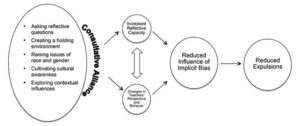
Beyond child outcomes, research has clarified the mechanisms driving change. The Center of Excellence for IECMHC’s Theory of Change (COE, 2021) highlights the importance of a strong, culturally responsive consultative alliance (CA), reflective supervision, and engagement with core consultation activities. Davis et al. (2018) found that the CA is strengthened when consultants bring expertise in cultural diversity or share racial/ethnic backgrounds with consultees. A strong cultural lens not only fosters better relationships but also disrupts bias, particularly for boys of color.
Building on this, Davis and colleagues (2022) emphasize that culturally responsive, reflective relationships are essential levers for advancing equity in IECMHC. Reflective supervision supports consultants in developing anti-bias practices, underscoring the need for professional development that explicitly addresses issues of race, culture, and gender. Consultants consistently report that equity-centered PD and reflective supervision are critical in preparing them to navigate the complexities of anti-bias work (Catherine, Davis-Schoch, Rand, & Perry, 2023; Catherine, 2024). However, implementing reflective supervision in developing contexts presents unique challenges, including limited time, inadequate resources, and a shortage of trained facilitators. Additionally, cultural norms, stigma surrounding mental health, and hierarchical organizational structures may hinder open reflection and emotional vulnerability. To be effective, reflective models must be adapted to reflect local values, relational norms, and systemic realities (Killian, 2018).
Given IECMHC’s demonstrated potential to interrupt systemic bias, PD systems must move beyond traditional technical training. A transformative approach must incorporate decolonizing processes: shifting beliefs, exploring positionality, supporting critical reflection on equity, and building capacity for courageous conversations about race and oppression (COE, 2025b). Centering these elements is essential for preparing consultants to foster equitable outcomes for marginalized children and families. The next sections describe the five essential PD elements needed to build strong anti-bias practice and propose a framework to achieve them.
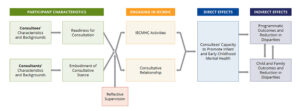
Toward Anti-Bias Consultation: Essential Elements and Framework
To fully realize IECMHC’s potential as a disruptor of bias, consultants must be intentionally prepared through PD grounded in racial equity and decolonizing practices. As the field has evolved to more diverse populations, such as families in home visiting, pediatric, and childcare settings, PD must move beyond passive acknowledgment of diversity. It must actively confront bias and structural inequities by equipping consultants to recognize, name, and address how racialized experiences shape IECMHC outcomes. This work requires PD systems to create intentional spaces where consultants engage in ongoing reflection, challenge Western assumptions about child development and caregiving, and practice difficult conversations about racism and bias. Research confirms that effective PD is not simply about transferring knowledge; it must foster critical consciousness, cultural responsiveness, and relational, contextual thinking (Hardy & Bobes, 2017).
However, not all consultants experience PD equitably. Black and Latino consultants report feeling less comfortable than their White peers in raising race and culture concerns in supervision (Shivers, Janssen, et al., 2022). Additionally, consultants of color often prioritize training grounded in non-dominant knowledge systems, which is frequently undervalued by White consultants (Shivers, Janssen, et al., 2022). These disparities highlight the need for PD to not only acknowledge racial differences but actively respond to them by diversifying content and methods. To move from acknowledgment to dismantling inequities, PD must center decolonizing practices. This requires more than content revisions; it demands a fundamental reshaping of how consultants are trained to recognize, challenge, and dismantle inequitable systems. Achieving this requires grounding PD in five essential elements, developed through semi-structured interviews with key equity informants in IECMHC research, evaluation, technical assistance, training, and PD. These Five Essential Elements (COE, 2025b) offer a roadmap for embedding decolonization into PD, equipping IECMHC consultants to advance equity both in mindset and practice. When integrated, these elements cultivate a culturally responsive workforce committed to equity and justice for all families.
Five Essential Elements for PD
- Shifting Beliefs and Thinking: Encouraging continuous learning and unlearning by engaging with perspectives traditionally excluded from IECMHC training.
- Exploring Positionality: Fostering self-awareness of how consultants’ identities, privileges, and biases shape their work.
- Reflecting on Equity Topics: Providing structured opportunities to deepen understanding of systemic barriers impacting Black, Indigenous, and other families of color.
- Practicing Difficult Conversations: Creating safe yet courageous spaces to navigate conversations about racism, discrimination, and bias with cultural humility.
- Embodying Anti-Bias Practice: Moving from theory to tangible action, ensuring policies and interventions dismantle rather than perpetuate harm.
For consultants to develop the skills necessary to produce positive outcomes for marginalized families, PD systems must embed the five essential elements (COE, 2025b). Embedding these elements allows consultants to continuously reflect on dominant norms and their influence on bias and practice. Therefore, it is crucial that PD systems are grounded in the parallel process and recognize the trainer’s critical role in modeling anti-bias practices that consultants can embody with their consultees.
PD Framework: Building Learning Communities
This section will describe a PD framework based on a qualitative study with 16 IECMHCs from a southwestern state. Participants were purposefully selected from a program focused on addressing race, equity, and bias in training. The sample included consultants with 1 to 10+ years of experience, and diverse racial and ethnic backgrounds, including White, Hispanic, Native American, and Asian participants, with a majority holding a Master’s degree and an average age of 39.
Findings from the study highlighted critical features for PD systems that support anti-bias consultation. Consultants emphasized the need for time to build trust and psychological safety within these environments. When consultants feel safe and comfortable, they are more likely to internalize anti-bias principles and apply them through the parallel process with their consultees, ultimately fostering equitable outcomes for young children and families. Participants also stressed the importance of equity-focused anti-bias PD occurring within relationship-focused and content-based models, such as Communities of Practice, Professional Learning Communities, and ECHOs. These settings allow consultants to engage with difficult topics in a supportive, safe environment, in contrast to traditional one-time trainings. Finally, consultants noted the necessity of opportunities for deep reflection and practice in navigating challenging conversations within these safe communities, leading to embodying anti-bias practice.
Based on these findings, the author, in collaboration with Georgetown’s Center of Excellence for Infant and Early Childhood Mental Health Consultation, co-developed a Professional Development Framework for Promoting Anti-bias Practice (COE, 2025a). This framework challenges dominant Western models that have historically shaped the field and addresses the need to recognize and dismantle the impacts of racism, anti-Blackness, and systemic inequities within IECMH. The framework (Figure 3) illustrates the relationship between the trainer, the IECMH consultant, and the IECMH consultee through a visual diagram of three overlapping circles, each representing one role, with arrows showing the flow of interaction and learning between them. The left circle, labeled “Trainer,” highlights the importance of “Relationship-Focused and Content-Based PD,” reflecting consultants’ expressed need for ongoing learning opportunities rather than isolated, one-time trainings. Arrows connect the Trainer to the IECMH Consultant (center circle), showing that the trainer provides opportunities to practice anti-bias strategies and to engage in deep reflection, leading to increased reflective functioning. In turn, the IECMH Consultant applies these same approaches with their consultees (right circle). Arrows forming a continuous loop among the circles illustrate the parallel process at the heart of PD (COE, 2025a).
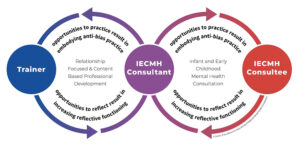
Excellence for Infant and Early Childhood Mental Health Consultation, 2025). Reproduced with permission from the Center of Excellence for Infant and Early Childhood Mental Health Consultation.
Discussion
In the United States, children of color—particularly Black, Indigenous, and Latino children and boys across racial groups face systemic inequities in early childhood settings, including disproportionate rates of expulsion, harsher discipline, and fewer opportunities for positive developmental support (Gilliam, 2005; U.S. Department of Education, 2016). IECMHC has emerged as a promising strategy to address these disparities by strengthening adults’ capacity to create equitable, culturally responsive environments. Research shows that IECMHC improves both child and adult outcomes and helps disrupt implicit bias, leading to reductions in exclusionary practices and stronger caregiver-child relationships (Duran et al., 2009).
However, for IECMHC to sustain these gains, a fundamental shift in PD is needed. Traditional PD models in the U.S. often emphasize technical skills or surface-level cultural competency, while overlooking the deeper work of addressing systemic power dynamics, privilege, and internalized bias. Decolonizing IECMHC PD requires intentionally designed learning environments where consultants are supported to critically reflect on their beliefs, positionality, and biases, and are equipped to challenge inequities at both personal and systemic levels. Globally, these efforts must also contend with distinct challenges. Barriers to implementing reflective practice across international contexts include limited time, insufficiently trained facilitators, organizational resistance, and cultural factors such as mental health stigma, language differences, and differing expectations of psychological support (Killian, 2018; Westerberg, 2016). These realities underscore the need to adapt reflective models to local relational norms and community-led frameworks, rather than Western models. Reflective capacity remains central to this work. Consultants must be supported to navigate discomfort, engage in deep self-reflection, and build the skills necessary to confront issues of race, power, and oppression in contextually responsive ways (Stroud, 2012). Moving forward, PD systems must be both content-rich and relationship-focused to prepare consultants for the complex, transformative work that authentic equity demands.
The qualitative study was approved by Arizona State University Institutional Review Board (IRB). Approval number: STUDY00014679. Approved 02/28/2022.
References
Brennan, E. M., Bradley, J. R., Allen, M. D., & Perry, D. F. (2008). The evidence base for mental health consultation in early childhood settings: Research synthesis addressing staff and program outcomes. Early Education and Development, 19(6), 982–1022. https://doi.org/10.1080/10409280801975834
Catherine, E. (2024). Advancing anti-bias practice through infant and early childhood mental health consultation. SRCD Anti-Racist Developmental Science Summit. Panama City, Panama.
Catherine, E., Davis Schoch, A., Rand, J., & Perry, D. (2023). Promoting anti-racist practices in infant and early childhood mental health consultation. Society for Research in Child Development (SRCD). Salt Lake City, Utah.
Center of Excellence for Infant and Early Childhood Mental Health Consultation. (2022). Status of the evidence for infant and early childhood mental health consultation (IECMHC). https://www.iecmhc.org/documents/CoE-Evidence-Synthesis.pdf
Center of Excellence for Infant and Early Childhood Mental Health Consultation. (2025) Professional development framework for promoting anti-bias consultation. https://www.iecmhc.org/wp-content/uploads/2025/04/CoE_PDSuite_FrameworkDocument_FNL-508-2.pdf
Center of Excellence for Infant and Early Childhood Mental Health Consultation. (2025). 5 essential elements of effective anti-bias professional development for mental health consultants. https://www.iecmhc.org/wp-content/uploads/2025/04/CoE_PDSuite_Checklist_FNL2-508.pdf
Center of Excellence for Infant and Early Childhood Mental Health Consultation (2021). Theory of change for infant and early childhood mental health consultation. https://www.iecmhc.org/documents/CoE-Theory-of-Change-Descriptions.pdf
Davis, A. E., Perry, D. F., & O’Kane, M. (2022). Expulsion prevention: Framework for the role of infant and early childhood mental health consultation in addressing implicit bias. Infants & Young Children, 35(2), 122–138.
Davis, A. E., Barrueco, S., & Perry, D. F. (2021). The role of consultative alliance in infant and early childhood mental health consultation: Child, teacher, and classroom outcomes. Infant Mental Health Journal, 42(2), 246-262
Davis, A. E., Shivers, E. M., & Perry, D. F. (2018). Exploring culture, race, and ethnicity in early childhood mental health consultation: The role of the consultative alliance. Perspectives, 3(2), 24.
Downer, J. T., Maier, M. F., & Witherspoon, D. P. (2020). Teacher-child racial/ethnic match within pre-kindergarten classrooms and children’s early learning: Exploring variation across racial/ethnic groups. Early Childhood Research Quarterly, 52, 74–84.
Duran, F., Hepburn, K., Irvine, M., Kaufmann, R., Anthony, B., Horen, N., & Perry, D. (2009). What works? A study of effective early childhood mental health consultation programs. Georgetown University Center for Child and Human Development.
Fabes, R.A., Quick, M., Musgrave, A., Meek, S., & Catherine, E., (2020). Exclusionary discipline in U.S. public pre-K programs: An initial look at the 2017-2018 CRDC data. The Preschool (and Beyond) Exclusionary Discipline Project: Research Brief (Issue 1). Tempe, AZ: Arizona State University
Gilliam, W. S., Maupin, A. N., Reyes, C. R., Accavitti, M., & Shic, F. (2016). Do early educators’ implicit biases regarding sex and race relate to behavior expectations and recommendations of preschool expulsions and suspensions. Yale University Child Study Center, 9(28), 1-16.
Gilliam, W. S. (2005). Prekindergarteners left behind: Expulsion rates in state prekindergarten systems. Foundation for Child Development.
Hardy, K. V., & Bobes, T. (Eds.). (2017). Promoting cultural sensitivity in supervision: A manual for practitioners. Taylor & Francis.
Heller, S. S., & Gilkerson, L. (Eds.). (2009). A practical guide to reflective supervision.
Killian, B. (2018). The challenges of reflective supervision in developing contexts. Infant Mental Health Journal, 39(1), 37–46
Meek, S. E., & Gilliam, W. S. (2016). Expulsion and suspension in early education as matters of social justice and health equity. NAM Perspectives.
Perry, D. F., Allen, M. D., Brennan, E. M., & Bradley, J. R. (2010). The evidence base for mental health consultation in early childhood settings: Research synthesis addressing child outcomes. Early Education and Development, 21(6), 795–824.
Parlakian, R. (2002). Reflective supervision in practice: Stories from the field. Zero to Three Center for Program Excellence.
Shivers, E. M., Janssen, J. A., Subramaniam, A., Parker, A. L., Noroña, C. R., Lara, C., Best, D., Yazzie, D. A., Cimino, J., Kohchi, J., Fitzgibbons, S. (2022). Digging Deeper: De-Colonizing Our Understanding and Practice of Reflective Supervision Through a Racial Equity Lens: First-Wave Findings. Prepared by Indigo Cultural Center for the Alliance for the Advancement of Infant Mental Health. With funding from Perigee Fund.
Shivers, E. M., Faragó, F., & Gal‐Szabo, D. E. (2022). The role of infant and early childhood mental health consultation in reducing racial and gender relational and discipline disparities between Black and white preschoolers. Psychology in the Schools, 59(10), 1965-1983.
Silver, H. C., Davis Schoch, A. E., Loomis, A. M., Park, C. E., & Zinsser, K. M. (2023). Updating the evidence: A systematic review of a decade of Infant and Early Childhood Mental Health Consultation (IECMHC) research. Infant Mental Health Journal, 44(1), 5-26.
Stroud, B. D. (2012). Intentional living: Finding meaning through reflective practice. ZERO TO THREE.
Westerberg, D. (2016). Reflective supervision across cultures: Challenges and lessons learned. ZERO TO THREE Journal, 36(3), 19–25.
Authors
Catherine, Evandra
Mulitauopele, Jordyn
Perry, Deborah F.
Rabinovitz, Lauren
Hepburn, Lisa
Horen, Neal
(United States)




